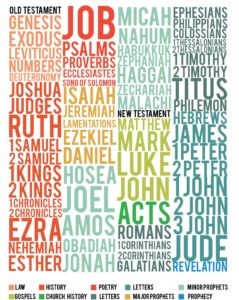You’re looking at a custom made stone containing the first two actions of God that begin the famous Aaronic Blessing of Numbers 6:22-27. The Blessing is extremely popular and has spawned tons of merchandise.
As you make your way through the book of Numbers you arrive at the end of chapter 6. This famous Blessing is sandwiched between laws of the Nazirite and the twelve days of sacrificing that dedicated the altar in the Tabernacle.
One of the keys of preaching the theology of Numbers is noting the placement of strategic teaching like this one: God’s blessing is experienced within the context of holiness and the forgiveness of our sins.
When you preach the Blessing, remember that there is a big difference between the ESV’s pronouncement: “The Lord bless you and keep you…” and the NLT’s prayer/wish: “May the Lord bless you and keep you…” Within the context I described in the above paragraph, yes, it can be a pronouncement. But the Hebrew form of the blessing and it’s meaning in this context reflects Aaron, the priests, and the Lord’s desire or wish for His people.
You might lead your listeners through the Blessing by noting…
- the source of God’s blessing. It’s easy for American Christians with all our individualism to miss the fact that Aaron and his sons pronounce this Blessing on God’s people. This will provide an easy link to our Savior in the third section of the sermon.
- the content of the Blessing. I can’t think of anything that should put a smile on our faces and thanksgiving on our lips than what the Lord wants to do to everyone one of His own! The poetry is beautiful and builds with each line.
- our reception of the blessing. Here’s where you can urge congregants to consider how they know they can experience this blessing that God wants to give them. It’s a good time to be Christ-focused, but also a good time to remind them of their need to respond in faith and obedience.
[Note: I assign this text as an assignment in my Advance Homiletics classes and v. 27 often gets neglected. The act of pronouncing the blessing is equal to putting God’s name on His people. Explaining this are sermon minutes well spent!]
Surely, our Lord receives glory in the church and in Christ Jesus (cf. Ephesians 3:21) as we preach this great passage in Numbers!
Randal
P.S. If you are interested in the intersection of hermeneutics and homiletics you might take a moment to consider why this Aaronic Blessing is much easier to preach then some other sections in Numbers.














